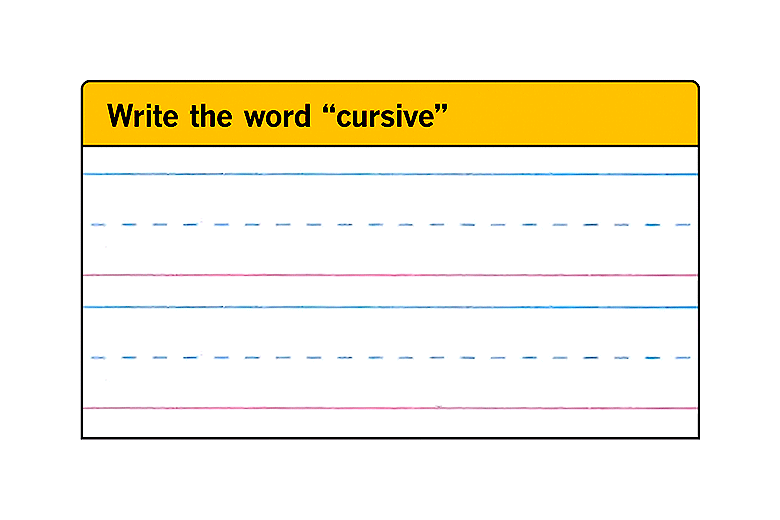Study Finds Johnny Can’t Write Too Well : Education: Most U.S. students cannot express themselves effectively, the Administration reports. Researchers link poor skills and TV viewing.
- Share via
WASHINGTON — For the 15 years Gwen Faulkner has been teaching fourth-graders here, she has faced a constant challenge: motivating her students to write.
She devotes large blocks of classroom time to writing and employs five Apple computers in her crusade. “Just giving them confidence that they can write is very important,” she said.
Faulkner’s youngsters are the lucky ones. A nationwide study released at Faulkner’s school Tuesday by Education Secretary Richard W. Riley found that fewer than 20% of American students can write a detailed, well-developed assignment.
By the time most students graduate from high school, they can pen at least “minimally developed” stories or essays, the study concluded. But “mediocrity is the norm and quality is the exception,” said Michael J. Guerra, executive director of the National Catholic Education Assn.’s secondary school division and a member of the study team.
The 1992 “Writing Report Card” was prepared by the Education Department’s National Assessment of Educational Progress, which examined writing samples from 30,000 fourth-, eighth- and 12th-graders. The study also included a questionnaire for students and teachers.
Among other conclusions, researchers found a correlation between poor writing skills and frequent television viewing. For example, 83% of fourth-graders reported watching more than one hour of television per day, while only 16% said they spent more than one hour per day on their homework.
“This tough new test tells us that we have our work cut out for us to improve the writing of American students but the good news is we know how to fix the problem,” Riley said.
He outlined what he said are keys to improving student writing proficiency: ask students to write lengthy pieces of at least three pages, expect students to plan their writing and work through several drafts and encourage students to read and write at home, for example.
But television and Nintendo are tough habits for schoolchildren to break, teachers said. And in many cases, schools cannot afford tools--such as computers--to help teachers point their students in the right direction.
The study concluded, however, that schools have improved the way they teach writing since the last time the Education Department studied writing quality in 1989. Teachers are assigning longer writing projects more frequently and are spending more time on student writing in the classroom, the researchers found.
However, they said, writing still is emphasized less than mathematics and other subjects. More than half of the eighth-graders in the study reported that their teachers “never or hardly ever” assigned long writing projects. In addition, teachers of eighth-graders said that the majority of their students spent less than two hours each week developing writing skills, compared to five hours per week on math.
And although most students grasp the basic stylistic features of both narrative and informative writing, many at each grade level failed to produce effective work.
“Even the best students who could write relatively effective narrative and informative pieces had difficulty with persuasive tasks,” according to the study.
American Federation of Teachers President Albert Shanker said that “pathetically small numbers of our students are becoming proficient writers” because of a lack of high standards and demanding writing instruction.
For Marilyn Whirry, a 12th-grade English teacher at Mira Costa High School in Manhattan Beach, the study results come as no surprise.
“A commitment must be made to continue the task so that when they leave high school all our young people will feel comfortable with writing and all will write well,” Whirry said. “We owe this to our students.”
Some of the report’s other findings:
* White and Asian students generally outperformed black, Latino and American Indians at all three grade levels.
* Girls wrote more effectively than boys at all three grade levels.
* Private school students did better than public school students.
* Students in wealthier urban areas outperformed those in poorer ones.
Writing Report Card
Fourth-grade persuasive writing samples. Spelling errors are included in the samples.
* “Minimally developed” writing was defined as a brief, vague or somewhat confusing response.
* “Developed” papers included necessary writing elements.
* “Elaborated” papers showed well-developed and detailed responses to the question and sometimes went beyond the specific requirements.
In this test question, fourth-graders were asked to write a letter telling the director of the United Space Center whether creatures from another planet should be kept here for study by scientists or be allowed to return to their planet.
MINIMALLY DEVELOPED
Dear director,
I think you should let the space creatures go. If you landed on a different planet would you want to look at by a whole bunch of scientists? I don’t think so.
Sincerely,
Analysis: The paper contains “clear advice accompanied by an emotional appeal about the propriety of studying the space creatures. However, the ideas offered are unelaborated--unexplained and undefended.”
DEVELOPED
Dear Space Center,
I think you should let the space creatures go back to their own planet because they probabley need to live on their planet. They probeley have different food then us and they probeley have different water and different houses and other things like that. They could maybe even die if they don’t get the food that they need and the water that they also need. So I don’t think that you should keep them and run the testes that you want to. That is my pick.
Analysis: The example contains “both a clear plan and a short argument about why the space creatures should be allowed to return to their own planet.”
ELABORATED
Dear Director of the space center,
I think it’s unfair to keep the creatures and their spaceship here. I know that we would know more if we keep them here. I personally think that they should have freedom to leave just as we have freedom to keep them here. Please let them go back to their planet. If I went to a different place they wouldn’t keep me as their hostage, so please don’t make these poor, harmless creatures stay as hostages. I think we would learn more if we let them go, because you would learn that you cannot know everything, somethings have to be secrets. If we let them go they just might let us in on a few secrets about them, how they live, and where they live. So I’m begging you to let them go, and live their own lives, on their own planet.
Yours truly,
Analysis: “Responses in this category either included a number of reasons why their suggested plan might work or a coherent plea.”
Source: The 1992 “Writing Report Card” by the National Assessment of Educational Progress; Associated Press
More to Read
Sign up for Essential California
The most important California stories and recommendations in your inbox every morning.
You may occasionally receive promotional content from the Los Angeles Times.













